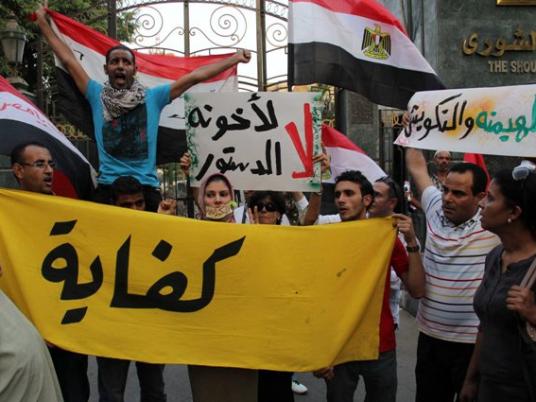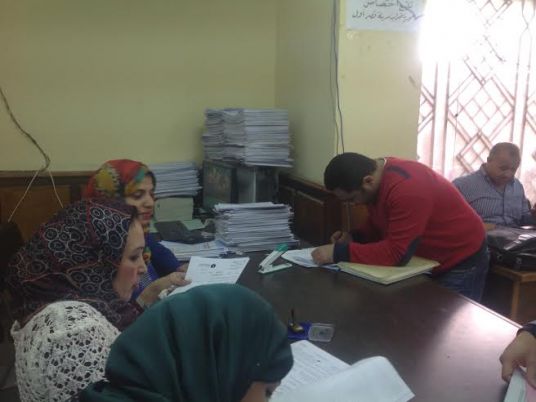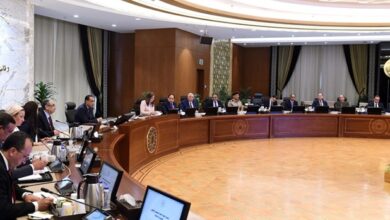
The new Cabinet reshuffle announced by Prime Minister Hesham Qandil late Saturday, as well as a looming conflict inside the opposition’s National Salvation Front, are major headlines marking Sunday’s newspapers in Egypt.
The new reshuffle affects 10 Cabinet positions, including the heads of the Ministries of Finance, Local Development, Transportation, Electricity, Civil Aviation, Interior, Environment, Legislative Affairs, Supplies, and Communication.
State-owned Al-Ahram newspaper said in its main headline that the swearing in of the newly appointed ministers will take place in front of President Mohamed Morsy early Sunday, and that improving economy, security and public services form the top of their executive agenda.
The reshuffle includes Brotherhood-affiliated ministers: Mohamed Ali Beshr for Local Development, who was previously appointed as Monufiya’s governor, Ahmed Imam for the Ministry of Electricity, Bassem Kamal for the Ministry of Supply and Social Affairs and Morsy al-Sayed Hegazy for the Ministry of Finance. Hegazy was previously Morsy’s advisor on energy issues and reportedly enjoys close relations with the Brotherhood.
The privately-owned Al-Tahrir newspaper deems the reshuffles a further “Brotherhoodization” of state institutions, saying that Beshir’s appointment will impose the group’s control over upcoming parliamentary elections, and that Hegazy’s was appointed to carry out the IMF’s instructions.
The dissident newspaper also describes the sacking of former Interior Minister Ahmed Gamal Eddin as a revenge move by the Brotherhood for the ministry’s stance on the violence following the contentious constitutional declaration. The newspaper says the new minister, Mohamed Ibrahim, enjoys a good relationship with the ruling group.
A looming split among the founding parties of the opposition National Salvation Front is expected to take place ahead of parliamentary elections, according to Al-Gomhurriya state-owned newspaper.
The paper quotes former presidential candidate and founder of the Popular Current coalition Hamdeen Sabbahi as saying in a meeting with former hopeful Amr Moussa that the front will contest elections with two party lists for “achieving the widest electoral winnings.” The liberal Constitution Party formed by Mohamed ElBaradei, as well as Sabbahi’s Popular Current, are expected to split away from the alliance with Moussa’s “Conference” Party as well as the Wafd Party.
The newspaper also reports that the Islamist current failed to form a unified Islamist alliance, as leaders of the Salafi Nour Party rejected an alliance with the Brotherhood’s Freedom and Justice Party. According to the paper, the ruling party will form a wider alliance that includes the Islamist Wasat, Labor, Hadara and Asala Parties, as well as secular parties like Ayman Nour’s Ghad Al-Thawra Party and Ramy Lakah’s Reform and Development Party.
Privately owned Youm7 reports that “disputes erupt” within the National Salvation Front following a contentious statement by the front declaring that the opposition would contest the upcoming elections only if 10 conditions are met, including the re-division of electoral constituencies, decreasing the numbers of voters registered in every electoral district to 500 voters only, holding all elections within one day and widening the powers of the high electoral commission.
Many leaders within the front claim that the statement does not represent them, adding that they were not consulted over it, while Mohamed Abul Ghar, head of the Egyptian Social Democratic Party, says that the statement represents his party’s vision only and that hedoes not know why the statement was published as representing the whole front.
But the party’s general coordinator, Ahmed Fawzy, tells Youm7 that five parties agreed on the statement, including his party as well as the Wafd, Constitution and Conference Parties, as well as the Third Current. He describes the differences among the front’s leaderships as health, as long as they do not turn into a real conflict, which hasn’t happened until now.
Privately owned daily Al-Watan gives a better image of the front. The paper reports on the front’s preparations for the upcoming commemoration of the 25 January revolution, quoting Abul Ghar as saying that the front will decide on their preparations for the day during their meeting Sunday.
Youm7 Editor-in-Chief Khalid Salah slams in his Op-ed Sunday the “illusions” of the opposition regarding the possibilities of ousting the Islamist government through revolutionary means, as happened with the Mubarak regime. A major difference, Salah argues, is the electoral legitimacy that the Brotherhood-affiliated president holds.
“I cannot understand how we can build Egypt through [street] mobilization away from the ballot boxes forever, and I cannot tolerate this narrow thinking by which some people think that we can get rid of the political Islam ideology with such ease and naivety,” he says.
Salah argues that there is no alternative to reaching a modern, secular state without redefining the discourse of the liberal current, as well as differentiating between moderate and extremist Islamist forces and relying on democratic solutions as the only means for a transition of power.
Egypt’s papers:
Al-Ahram: Daily, state-run, largest distribution in Egypt
Al-Akhbar: Daily, state-run, second to Al-Ahram in institutional size
Al-Gomhurriya: Daily, state-run
Rose al-Youssef: Daily, state-run
Al-Dostour: Daily, privately owned
Al-Shorouk: Daily, privately owned
Al-Watan: Daily, privately owned
Al-Wafd: Daily, published by the liberal Wafd Party
Youm7: Daily, privately owned
Al-Tahrir: Daily, privately owned
Al-Sabah: Daily, privately owned
Freedom and Justice: Daily, published by the Muslim Brotherhood's Freedom and Justice Party
Sawt al-Umma: Weekly, privately owned
Al-Arabi: Weekly, published by the Nasserist Party
Al-Nour: Official paper of the SalafiNour Party




